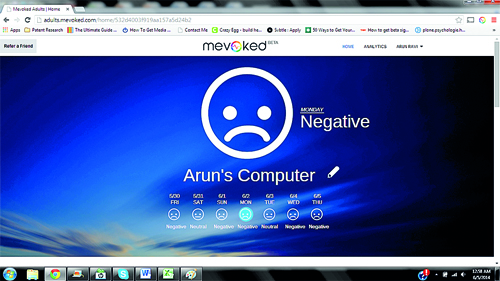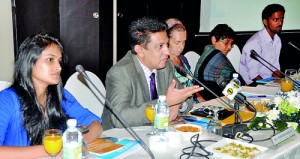Sunday Times 2
Engaging social media: Welcome to the age of digital parenting
The tragic suicide of a friend when he was 13 years old inspired Arun Ravi to develop Mevoked. He remembers his friend’s parents wishing they had only known of the despair their son was feeling. Decades in the making, Arun’s new app is an answer to them. When you install it – a basic version is free of cost – it summarizes data from sources like URLs, web searches, Twitter and Facebook in real time.

Arun Ravi’s latest app
“We then focus on content that is either violent, sexual, drug or mental health related,” Arun tells the Sunday Times in an email. Parents can contribute with observational data so that they are “aware of what’s going on and can intervene before any serious situation arises.”Like all technology, the app has its pros and cons (for instance, it’s easy enough for a clever teenager to circumvent). Families will need to discover what works and what doesn’t – for the most part on their own. Welcome to the age of digital parenting.
In a time when a 10-year-old can teach his/her parent a thing or two about navigating the web and how social media works, parenting has become that much more challenging. Even a passing reference to banning Facebook can kick up a storm of protest. When President Mahinda Rajapaksa said on Twitter (he has 33,000+ followers on the site) that such an attempt would trigger a rebellion in his own family, he laid the concerns of many to rest. Still, the question has remained: should we be preparing our populace more carefully for a world whose borders now stretch far into the digital realm?
A roundtable discussion held by the Sri Lanka College of Journalism, the Sri Lanka Press Institute, the Press Complaints Commission of Sri Lanka and UNICEF brought editors and practising journalists together to answer the question: should media promote online literacy and safety for children? Having witnessed, first hand, the powers of social media to mobilise and convene young people in large numbers at the 2014 World Conference on Youth, Charitha Herath, Secretary to the Ministry of Mass Media and Information said it was time to engage fully with “practical, dynamic new media.”
Acknowledging the government’s inability to effectively police the entire internet, he added: “The digital jungle is not a regulated area, we all need to recognize that. The only way out is to engage.” Still, it’s the thought of such engagement that is giving some parents sleepless nights. In the wake of hysterical headlines that blamed Facebook for the suicides of two young girls, anecdotal evidence suggests some families are keeping their children offline. For the youngest panellists speaking at the event, that’s far from an ideal solution.
For Megara Tegal, a journalist, and Udara Dharmasena, a coordinator of Mobile4D Projects at Sarvodaya Fusion, the advantages of being online and active are worth considering. Ease of access to information, the ability to publish their opinions and articles without

Speakers at the roundtable discussion. Pic by Ranjith Perera
waiting on mainstream media and the ever expanding networks that sustain them personally and professionally are only some of the advantages. “I like the community there, it’s really grown,” says Udara, speaking of a group that comes not just from every corner of the island but across the world. “It’s a new window for me.” For Megara, “getting information when it happens, as it happens,” is an indispensable advantage in her line of work.
Nalaka Gunawardene, science writer and ICT watcher sees their point, describing it as “imperative” to allow children to use information and communications technologies (ICTs), He tells the Sunday Times “the alternative is to hold our kids back from engaging with the globalised information society. There are many online opportunities for learning, skills developing and career choosing, which our kids will be deprived of if kept away from the web and social media.”
For Hana Ibrahim, Chief Editor of Ceylon Today, social media represents “modernity in the assorted values of freedom, tolerance and diversity,” but she does emphasise the need for caution. “The world is not a perfect place,” she said.”Social media is a reflection of the imperfect world. Bullies, paedophiles, sexual predators and assorted others are prowling the online space. The young, the naive and the emotionally vulnerable are the most susceptible to the monstrous influence of those entities.”
In essence, misogyny, child abuse and bullying exist offline, why wouldn’t they exist online? And considering that, is media being wilfully irresponsible when it identifies platforms like Facebook as being the threat? Is part of the problem that some parents just aren’t media savvy enough to make the distinction?
Nalaka’s verdict is that there is much to be desired in terms of digital media literacy among Sri Lankans: “As a nation, we have had commercial Internet connectivity for 19 years, yet we have not reached a satisfactory level of cyber maturity among those who regularly go online, (estimated to be around 18 – 20% of the population).”
He points out that our children are already ‘Digital Natives’ – “persons for whom digital technologies already existed when they were born, and are therefore growing up ‘being digital’.” “Those of us who are 35 years or older are ‘digital immigrants’ who had to master digital skills after our formative years,” Nalaka tells the Sunday Times. “Some of us never really made that leap…and that leads to social tensions. In many Lankan households, kids can easily teach their parents on using ICT tools and web based platforms including social media.”
Then how can we help prepare our children to use tools we might not fully understand ourselves, moreover, ones that are constantly evolving? As Sanjana Hattotuwa, the editor of the website Groundviews pointed out in the discussion that followed the panel: “Who knows what a Stanford drop-out is going to invent tomorrow?” Emphasising that a solution couldn’t be “technology specific,” he added parents needed to discover social media for themselves, otherwise attempting to lecture their children would be “like trying to teach someone to swim through a PowerPoint presentation. It just can’t be done.”
One possible solution is to design campaigns on social media itself that help children understand the workings of the medium. “I think the internet itself should be used as a tool to raise this kind of awareness. Youth-friendly videos in different local languages, cartoons etc. could be used to raise awareness. Furthermore, privacy controls and using social media safely should be taught in schools,” says Senel Wanniarachchi, one of the speakers on a subsequent panel.
For Abdul Halik Azeez, blogger and business consultant, the trick is in instilling ‘digital common sense.’ He believes the message that needs communicating is that “social media can in certain ways be just as ‘real’ as real life in terms of the consequences of what you reveal, who you engage with and how you interact.”
As for parents, Nalaka thinks they should “at a minimum…know the basics about the multitude of social media platforms, dynamics and interactions. Ideally, they should also have some understanding of its always-on, never-ceasing nature…Social media is not just Facebook, even though that is the most prominent platform. Social media comes in various forms and shapes, and each one has its own set of terms.”
In the end, it’s clear that while there are answers, none of them come easy. The web continues to hold up a mirror to our society, and the patterns we see only become increasingly intricate and complex as more and more of us get connected. In many ways, our children are on the exhilarating, chaotic frontlines; grappling with and shaping the constantly mutating forms of these new technologies. Any attempt to arm them has to be about more than just promoting ‘digital media literacy,’ though that is key.
To keep them safe we need to build a space more respectful, more forgiving, and as Nalaka puts it, to “evolve more tolerant and pluralistic ways of engagement.” The cynical may debate the likelihood of this happening but as far as ambitions go it’s one that will serve us equally well, both online and off.

